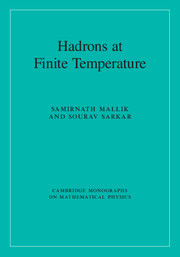Description
Hadrons at Finite Temperature
Cambridge Monographs on Mathematical Physics Series
Authors: Mallik Samirnath, Sarkar Sourav
An elementary introduction to hadronic properties at finite temperature and density that develops real-time methods of thermal field theory.
Language: English
Subject for Hadrons at Finite Temperature:
Approximative price 141.33 €
In Print (Delivery period: 14 days).
Add to cart
Publication date: 10-2016
262 p. · 18.2x25.4 cm · Hardback
262 p. · 18.2x25.4 cm · Hardback
Description
/li>Contents
/li>Biography
/li>
High energy laboratories are performing experiments in heavy ion collisions to explore the structure of matter at high temperature and density. This elementary book explains the basic ideas involved in the theoretical analysis of these experimental data. It first develops two topics needed for this purpose, namely hadron interactions and thermal field theory. Chiral perturbation theory is developed to describe hadron interactions and thermal field theory is formulated in the real-time method. In particular, spectral form of thermal propagators is derived for fields of arbitrary spin and used to calculate loop integrals. These developments are then applied to find quark condensate and hadron parameters in medium, including dilepton production. Finally, the non-equilibrium method of statistical field theory to calculate transport coefficients is reviewed. With technical details explained in the text and appendices, this book should be accessible to researchers as well as graduate students interested in thermal field theory.
Preface; Notation; 1. Free fields in vacuum; 2. Spontaneous symmetry breaking; 3. Chiral perturbation theory; 4. Thermal propagators; 5. Thermal Perturbation Theory; 6. Thermal parameters; 7. Two-loop results; 8. Heavy ion collisions; 9. Non-equilibrium processes; Appendix A. General fields; Appendix B. Global symmetries; Appendix C. Exponential operator; Appendix D. Propagator at origin of coordinates; Appendix E. Reaction rates in vacuum and medium; Appendix F. Coupling constants; Appendix G. Imaginary time method; Appendix H. Quark condensate from partition function; Appendix I. Quark condensate from density expansion; Index.
Samirnath Mallik is an Emeritus Scientist at the Saha Institute of Nuclear Physics. He previously worked at the University of Bern, the University of Karlsruhe and the Tata Institute of Fundamental Research. His research interests are thermal field theory and heavy ion collisions.
Sourav Sarkar is a scientist at the Variable Energy Cyclotron Centre, Kolkata, and an Associate Professor at the Homi Bhabha National Institute. His research interests concern the applications of thermal field theory, mainly to study transport phenomena and hadronic properties in a hot and dense medium.
Sourav Sarkar is a scientist at the Variable Energy Cyclotron Centre, Kolkata, and an Associate Professor at the Homi Bhabha National Institute. His research interests concern the applications of thermal field theory, mainly to study transport phenomena and hadronic properties in a hot and dense medium.
© 2024 LAVOISIER S.A.S.
These books may interest you

Hadron Physics 74.82 €



